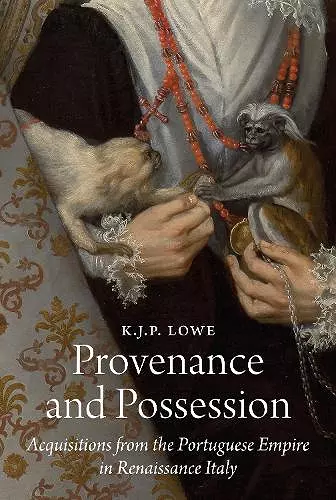Provenance and Possession
Acquisitions from the Portuguese Empire in Renaissance Italy
Format:Hardback
Publisher:Princeton University Press
Published:4th Jun '24
Should be back in stock very soon

A thought-provoking study of how knowledge of provenance was not transferred with enslaved people and goods from the Portuguese trading empire to Renaissance Italy
In the fifteenth and sixteenth centuries, Renaissance Italy received a bounty of "goods" from Portuguese trading voyages—fruits of empire that included luxury goods, exotic animals and even enslaved people. Many historians hold that this imperial "opening up" of the world transformed the way Europeans understood the global. In this book, K.J.P. Lowe challenges such an assumption, showing that Italians of this era cared more about the possession than the provenance of their newly acquired global goods. With three detailed case studies involving Florence and Rome, and drawing on unpublished archival material, Lowe documents the myriad occasions on which global knowledge became dissociated from overseas objects, animals and people. Fundamental aspects of these imperial imports, including place of origin and provenance, she shows, failed to survive the voyage and make landfall in Europe. Lowe suggests that there were compelling reasons for not knowing or caring about provenance, and concludes that geographical knowledge, like all knowledge, was often restricted and not valued.
Examining such documents as ledger entries, journals and public and private correspondence as well as extant objects, and asking previously unasked questions, Lowe meticulously reconstructs the backstories of Portuguese imperial acquisitions, painstakingly supplying the context. She chronicles the phenomenon of mixed-ancestry children at Florence’s foundling hospital; the ownership of inanimate luxury goods, notably those possessed by the Medicis; and the acquisition of enslaved people and animals. How and where goods were acquired, Lowe argues, were of no interest to fifteenth- and sixteenth-century Italians; possession was paramount.
"Provenance and Possession deserves close reading by anyone interested in issues surrounding the ownership of global objects and the identity of forcibly displaced persons. . . .Lowe demonstrates the power of high-level archival research, in which unexpected treasures and questions can spring from documents at every turn."---Stefan Bauer, Times Literary Supplement
"Dr. Kate Lowe’s marvellous new book Provenance and Possession . . . is a revelation. . . . [It] presents a whole new way of thinking about provenance."---Michael Backman Ltd.
"Provenance has received increasing and urgent attention as a means for contemporary scholars, curators, and collectors to determine the authenticity, context, and meaning of a work. However, Lowe grounds her study in archival records and finds that provenance functioned differently in the record-keeping and collecting practices of the Italian Renaissance. . . . Lowe’s contributions offer productive, historically grounded methods to readdress discourses about collecting practices, and the agency and ontology of objects within history, art history, and material studies."---Araceli Bremauntz Enriquez, H-Net Reviews
"Through her meticulous analysis of specific records Lowe makes important discoveries, challenges easy assumptions, and illuminates the trajectory and reception of global goods in Renaissance Europe in exquisite and thought-provoking detail. Provenance and Possession is a masterful work from a scholar at the height of her powers."---Samantha Kelly, Sixteenth Century Journal
"In many ways, Provenance and Possession is like a walk through the market stalls of sixteenth-century Lisbon as Campana or Biondi would have experienced them. In it, we peruse unexpected goods that we were not seeking but which are available and present, just like the sources Lowe used to craft her work. Unlike either of them, though, Lowe is an expert and deftly guides her readers along the path of “context enhancement,” resulting in unanticipated and sometimes challenging conclusions refreshingly well grounded in the documents, art, and artifacts of the period."---Bryan Givens, Renaissance Quarterly
ISBN: 9780691246840
Dimensions: unknown
Weight: unknown
408 pages